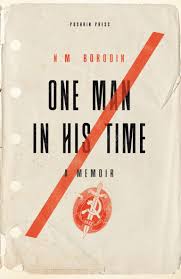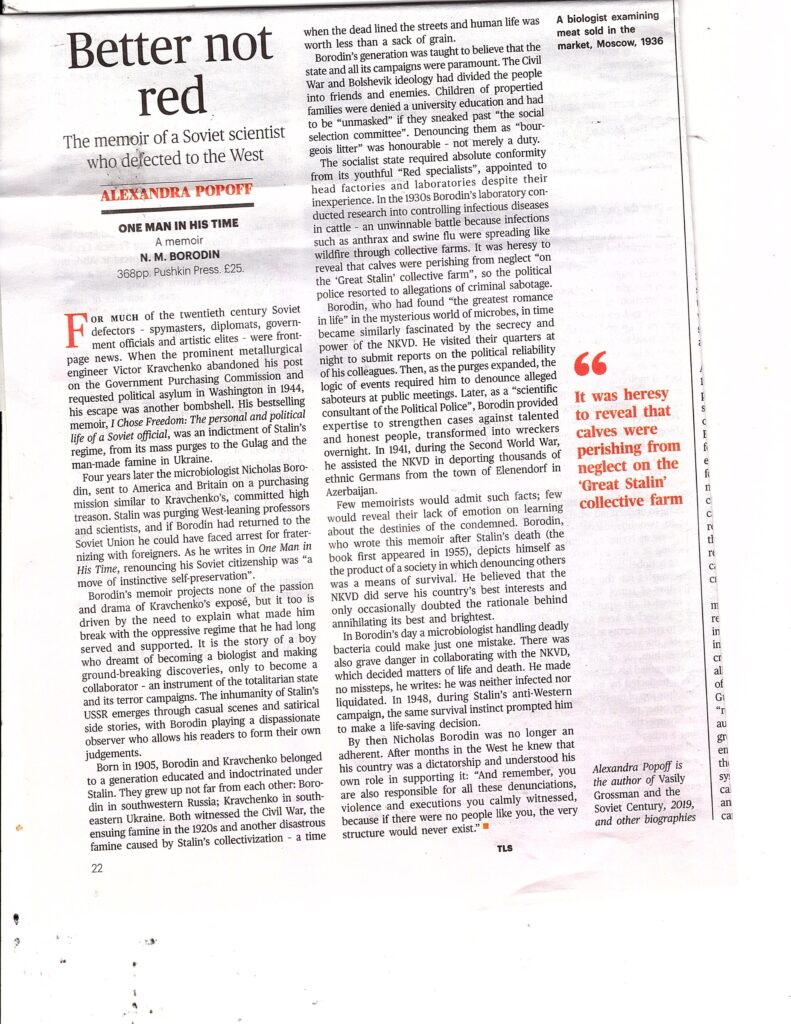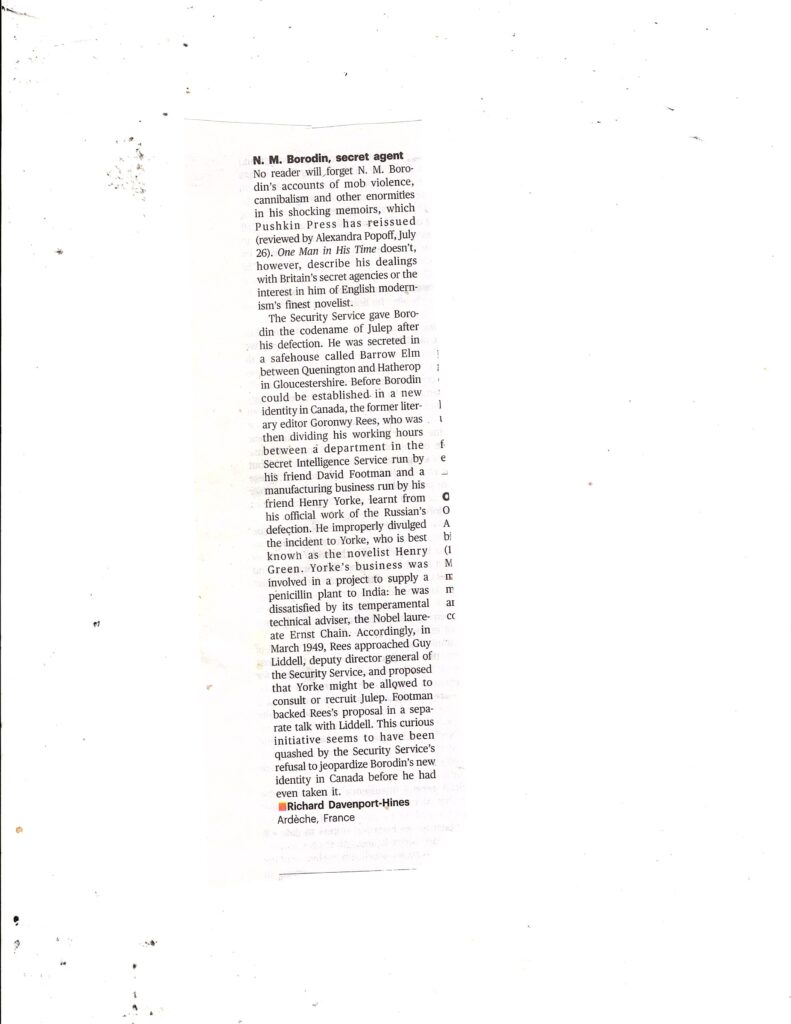
In the July 26 issue of the Times Literary Supplement appeared a review of One Man in His Time, a memoir by one N. M. Borodin. Originally published in 1955, the volume has recently been re-issued by the Pushkin Press, and claims to tell the life-story of a Soviet microbiologist who defected in the United Kingdom in 1948, but delayed writing his memoir until after Stalin’s death in 1953. I present the review below: for those with access, it can be read at https://www.the-tls.co.uk/lives/autobiography/one-man-in-his-time-n-m-borodin-book-review-alexandra-popoff/.

The name of a defector ‘Borodin’ was vaguely familiar to me. I recalled seeing his name somewhere in Guy Liddell’s Diaries. Yet it was very difficult to find other published information about him. Nigel West has listed him in a couple of places – but states his place of defection as Vienna in his Dictionary of Cold-War Espionage. Kevin Riehle does not mention him in his definitive work Soviet Defectors. Riehle’s work, however, concentrates on staff officers of the Soviet Union’s intelligence services, and, since Borodin was attached to a trade mission like Victor Kravchenko (of I Chose Freedom), does not meet Riehle’s criteria. I thus decided to order the book forthwith, and started digging around in my electronic archives.
Two weeks later, a letter on Borodin by that tenacious chronicler of early twentieth-century Britain, Richard Davenport-Hines, appeared in the TLS (see https://www.the-tls.co.uk/regular-features/letters-to-the-editor/awkward-posture/) . It added some fascinating insights concerning Borodin’s associations with Britain’s secret agencies, as well as his relationship with an author whom Davenport-Hines classifies as ‘English modernism’s finest novelist’, Henry Yorke, who wrote under the alias Henry Green. (I find Green unreadable, but that is neither here nor there.)

By this time, I had completed a first pass at performing my own research on Borodin, and quickly wrote a letter to the Editor of the TLS, which I emailed on August 7. I present the text here:
I should like to augment Richard Davenport-Hines’s fascinating observations on N. M. Borodin and Goronwy Rees (Letters, August 2). I believe that the events were a little more sinister than represented in the description by Mr. Davenport-Hines.
On January 19, 1948, Anthony Blunt (whose expertise in bacteriology has been a well-protected secret) came to see Guy Liddell, to let him know, based on information coming from Goronwy Rees via Guy Burgess, that an MI5 officer had been clumsily prowling around the premises of Bennett and Shears, the company at which Rees was a director, asking questions about ‘mobilisation in Russia’. It turned out that the officer was MI5’s famous interrogator, Jim Skardon: the outcome was that Liddell met Rees, who told him openly that the Russians were buying penicillin plant from his company.
Thus, on February 4, at a meeting of the Joint Intelligence Committee, the fact that Borodin had been noticed buying penicillin manufacturing capabilities, which could be used by the Soviets to advance their bacteriological warfare capabilities, was reported. Guy Liddell wrote: “If we could satisfy ourselves about his intentions and knowledge, we might consider him as a potential defector and take steps accordingly”. One of those steps was to ascertain whether he had any relatives in Russia who might be harmed. Two weeks later, the ‘Borodin case’ had advanced to the degree that Kenneth Strong and Liddell believed that exploiting Borodin could result in some breakthrough insights on the Soviet Union’s intentions. By March 5, the situation had progressed to the degree that Borodin had to be considered as an exception to the tightening restrictions on Soviet citizens.
It was soon recognized, however, that the British harboured a Communist sympathizer at the heart of their bacteriological warfare planning. On February 23, Liddell and his colleagues discussed the person (whose name has been redacted), expressing their concern about him, who had been a member of the Communist Party until 1943. It is probable that the scientist was Howard Florey, who had been recruited by another notorious Communist J. B. S. Haldane. Florey was well-known for wanting the fruits of penicillin to be made available for all mankind, while his collaborator and fellow Nobel-prize winner Ernst Chain had wanted patents on the process of manufacturing penicillin to be applied for.
On March 11, Liddell had a further discussion with Rees and Blunt about the penicillin business, where, again, the presence of the art-historian, who had retired from MI5 a few years before, might have caused some eyebrows to be raised. Liddell specifically brought up the point that, if the Russians had the technical know-how for making a penicillin plant, it might give them a two years’ advance in creating agents of bacteriological warfare. Why he thought it suitable to share these insights with the pair of one-time (and maybe current) Soviet agents is not clear.
Yet a complete bouleversement of the Floreyan case appeared to occur by the following September, when Professor Florey himself came to see Liddell, alongside Lang Browne, to discuss Dr. Chain. Liddell wrote: “Dr. Chain, who had somewhat improperly entered into a contract with the Trade Delegation (Soviet) to sell them information about penicillin, has now gone on a year’s holiday in Italy. Florey hopes to edge him out, but if necessary would like, at some future date, to inform the appropriate authority at Oxford that we could confirm the Professor’s information about the disreputable conduct of Dr. Chain.”
Other accounts suggest that Chain had gone to Italy to work, not rest and play, and that, frustrated by the lack of commitment from the British Government to fund penicillin-manufacturing capabilities, had found a responsive chord with the Italians. Was Florey trying to cover his own disloyalty by denigrating his ex-colleague in this way? After all, it was clear that the Americans did not want the secrets of penicillin manufacturing to leave U.S. or British shores. Florey may have been successful in his accusations, because Chain was thereafter twice refused a visa to enter the United States.
It is notable that Russian sources credit Borodin with successfully kick-starting the Soviet Union’s industry. In an article from 2022, E. V. Shertsneva profiled Borodin, stating that the scientist ‘while on scientific assignments in England, provided the USSR with important scientific and technical information and producers [sic] for production of penicillin and streptomycin’, and that his contribution was recognized by the Soviet leadership. If, indeed, Borodin did successfully defect, he either did so after he had passed on the industrial secrets, or he ensured that a replacement would perform the work for him. In any event, Borodin was reported as speaking at a conference on Russian affairs held at Oxford University on August 9, 1949, an event at which Guy Burgess also gave an address.
A final twist to the story was provided when Rees was being interviewed about his revelations concerning Burgess and Blunt in June 1951, soon after the disappearance of Burgess and Maclean. An entry in his MI5 file written by J. D. Robertson (B2) states that an MI5 officer ‘will bear in mind the suspicion that Goronwy REES when leaving Government employment for business, may have played a part in assisting the Russians to obtain penicillin equipment from America, of which the Americans were at the time anxious to ban the export to the Soviet Union’. Were they wrong about Rees? Or had he arranged for the dirty work to be completed before he presented himself as a loyal informer?
In any event, Guy Liddell was shown to be an atrocious judge of character, and a very undisciplined protector of privileged information. He managed to share secrets of bacteriological warfare with four very dubious characters: Rees, Burgess, Blunt – and Footman, his previous colleague in MI6. Ironically, Rees’s file later states that Footman was also believed to have been an agent of the Russian Intelligence Service. Whatever Borodin had been up to, and what the terms of his defection were, would all certainly have been relayed to the Kremlin. In Alexandra Popoff’s review of ‘One Man in his Time’ (July 26), she writes that Borodin was able to declare in his memoir that ‘he was neither infected nor liquidated’. But what happened to him? And was his defection real?
I did not receive any communication back from the Editor, but hoped that the letter might appear in the issue dated August 16. When an email announcing the publication of that issue appeared in my email box at 1:30 local time on July 15, I quickly learned that the Editor (Martin Ivens) had regrettably decide not to publish my letter (It was longer than most submissions, admittedly). Yet I must assert that I believe his judgment was at fault, for the following reasons:
- My letter was twice as interesting as that of Mr. Davenport-Hines. [Only ‘twice’? Would you not agree that ‘three times’ would be more accurate? Ed.] It could have provoked some exciting new observations.
- Martin Ivens missed a great opportunity to position the TLS as a leading vehicle for eliciting breakthrough research in intelligence matters, a topic of unfailing and enduring interest with the reading public.
- There exists an odd symmetry between Davenport-Hines and me. I accept that he is a far better-known author (and must be the ‘doyen’ of one particular sphere, I am certain), but we have a shared history. When Misdefending the Realm was reviewed by Mark Seaman in the TLS several years ago, my book shared space with Davenport-Hines’s Enemies Within (see https://coldspur.com/misdefending-the-realm/). That was before Ivens’ time.
I notice also that Davenport-Hines’s most recent book is titled History in the House: Some Remarkable Dons and the Teaching of Politics, Character and Statecraft, which was reviewed in the Spectator of August 3. It consists of a series of essays about ‘a select and self-regulated group of men who taught modern history’ at Christ Church, Oxford in the 19th and 20th centuries. Despite my affection for the place (I am an alumnus of the college), this compilation sounds only slightly more engaging than Beachcomber’s Anthology of Huntingdonshire Cabmen. Indeed, the reviewer Nihil Krishan opined that ‘it was faintly surprising that such a book found a trade publisher at all’.
But back to Borodin. Meanwhile, I have been extending my research. My copy of One Man In His Time arrived on August 10, and I have read just over one hundred pages so far. (I have other important books on the boil.) I dug around to try and determine the discrepancy in the name of Pontifex, and that of Bennett and Shears, and discovered that the latter company had been acquired by Pontifex back in 1908. I verified that Goronwy Rees had completely ignored his employment by Pontifex and by MI6 in A Chapter of Accidents, and that his daughter had innocently described the firm as ‘brewers’ engineers and chemical plant manufacturers, or in other words, coppersmiths and brassfounders’. Liddell’s Diaries pointed to more strategic and confidential manufacturing processes.
I also discovered one or two further entries in Liddell’s Diaries that had escaped me beforehand, partly because names had been redacted. I overlooked the following entries:
- On February 26, the penicillin problem was discussed at a meeting of the Bacteriological Warfare Committee. Liddell pronounced that ‘Sir Paul Fildes was the last word in BW’, and recorded the USA’s strict policy for requiring control of the technology for manufacturing the drug.
- On March 5, a need for making Borodin’s case a special one was discussed in the context of tighter registration requirements for Soviet citizens in the country.
- On May 18, an apparent conflict between Professor Florey and Professor Fildes emerged. John Marriott reported to Liddell on Florey’s seeming ‘to indicate that there would be no harm in allowing the Russians to purchase penicillin plant in this country. This, in spite of the fact that an entirely contrary view had been expressed by the eminent Professor Fildes, who is supposed to be the last word in B.W.’
- On July 2, more facts emerged about Borodin. Liddell was told by Dick White that Borodin [though his name is redacted] ‘has turned up at Florey’s at Oxford and has asked him for his assistance. John Marriott is to go down to Oxford to see Florey.’ It might appear that Florey would not be a useful confidant for someone in Borodin’s position.
- Later that same day, Liddell was able to write: “John Marriott has arrived back from Oxford. Everything has gone extremely well. XXXX is not in the least apprehensive. He has thought out everything very carefully. He does not think that his return to Russia will [sic!] have any effect on the fate of his family either one way or the other, but is certain that he himself will be liquidated. He intends to remain in his department and clear up all his affairs so that there can be no accusation of misappropriation of funds. He says that nobody here can question his visits anywhere as he is master in his own house and would not brook interference from anyone except the Ambassador. He has a great deal to tell us and is willing to co-operate to the full.”
I found these passages very alarming. The last suggests that Borodin at that time intended to return to Russia and face the consequences. His return to Russia is phrased in the future tense, not the conditional, and is reinforced by the words ‘is certain that he himself will be liquidated’. And the duplicity of Florey, at one moment stating that no harm could come from allowing the Soviets to buy penicillin plant, and then, a few months later, denigrating Chain in his absence, is shocking.
I also discovered an article written a few days ago by a Dr. Anthony Rimmington, posted on ‘Medium’, about Borodin, visible at https://medium.com/@t.rimmington/the-spy-who-came-in-from-the-mold-n-borodin-the-first-russian-biological-defector-to-the-west-516d8dfa03b3. Rimmington is a former Senior Research Fellow at Birmingham University. I reached out to him via his publisher, who forwarded my message, but I have not yet heard back from him.
That’s it for now. I noticed that Borodin claimed that he had acquired vital penicillin technology as early as 1946, so there are a lot of questions still to be answered concerning his defection, and what happened to him afterwards. When I have finished his book I shall return to this investigation, construct a proper chronology, and hope that I may have received useful information in the interim.

On reading Guy Liddell’s diary entries covering sale/transfer of penicillin production capabilities to the Soviet Union, my initial attention was drawn to his ongoing familiarity with Antony Blunt, Guy Burgess and Goronwy Rees, rather then the dilemmas generated by such exports. However, while pursuing another topic I stumbled upon an interesting passage in George Charles Eltenton’s statement to the FBI that also mentioned penicillin. In that passage, he outlined the efforts ( via Haakon Chevalier ) to enlist the help of Julius Robert Oppenheimer to acquire nuclear research data on behalf of Peter Ivanov, a Soviet consulate employee. Rebuffed by Oppenheimer, Ivanov subsequently requested Eltenton to seek out any information on penicillin, unfortunately the latter could not obliged as he knew very little about the substance [1]. So it appears that as far back as 1943, the Soviets had a heighten interest in penicillin along with nuclear research.
Notes:
[1] TNA, KV2-3875, Item 10a, ( Oppenheimer ). The same passage can be found in TNA, KV2 – 2166, Item 66a, ( Eltenton ).
Thanks, Edward. Useful leads to follow up.
And I have learned that one of Lord Rothschild’s roles was to advise MI5 on matters of bacteriological warfare.
Tony.